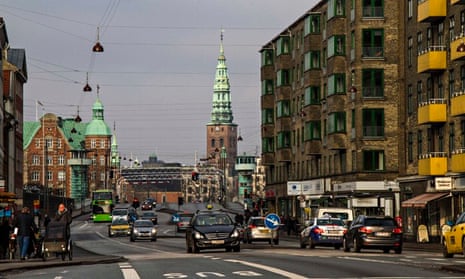A Danish bid to expand carbon offsetting to the transport sector has triggered uproar among NGOs and academics, with one new analysis saying it would devastate efforts to reign in fuel emissions.
Transport is responsible for a quarter of Europe’s CO2 pollution and, unlike most sectors, its contribution is rising fast – up 36% since 1990. About half of Europe’s transport emissions come from cars and the EU has ordered car-makers to slash their fuel emissions by 2021.
But the latest draft of the EU’s 2030 climate and energy package, due to be agreed later this week, suggests counting transport emissions within the EU’s emissions trading system (ETS). The document, seen by the Guardian, calls for concrete proposals allowing states to achieve their climate goals with “a new flexibility”.
“We want that flexibility,” said Martin Lidegaard, the foreign minister of Denmark, which has championed the proposal. “All countries of Europe could benefit from this flexible approach. That’s why we’re pressing for it as a solution.”
Denmark is implementing some of Europe’s most ambitious greenhouse gas-cutting plans and aims to meet the EU’s likely 2030 goal of a 40% emissions cut by the end of this decade. But environmentalists say that Copenhagen has also fallen foul of EU obligations which measure emissions cuts in sectors outside the ETS, such as transport and agriculture.
Greg Archer, the clean vehicles manager for the Transport and Environment thinktank told the Guardian that Denmark was now trying to bend the rules in a way that would hurt the rest of the continents carbon-cutting plans.
“The effect of this proposal would be to undermine progress in improving the efficiency of vehicles and cutting transport emissions,” he said. “It would be more expensive for drivers, and it would mean that transport doesn’t have to substantially reduce its emissions, just buy allowances from other sectors as that will be the cheaper way of offsetting their emissions. The net effect would be to put back the point at which transport has to bring down its emissions and decarbonise.”
A new report by Cambridge Econometrics, which the Guardian has seen, backs these concerns, finding that it would take a carbon price of €271 between 2020-2030 to achieve the same fuel economy standards as with a legally-binding target like the 2021 one. The carbon price is currently around €6 a tonne.
Without the 2021 target for new cars, the ETS alone would deliver a mere 1% efficiency improvement by 2030, it says. “This would be insufficient for the road transport sector to contribute proportionately to the EU’s stated goals for decarbonisation,” it says.
German car-makers such as BMW and Daimler, which lobbied hard against the 2021 target, have long preferred a looser regulatory framework, and a €6 per tonne price on emissions levied against fuel suppliers would offer that.
At a panel meeting in Stuttgart last year, Dieter Zetsche, the chief executive of Daimler reportedly described the development of CO2 fuel standards as “carpet trading” and suggested moving transport emissions into the ETS instead.
Compared to fuel regulations, a BMW briefing paper describes emissions trading as “the more suitable instrument.” The document says: “Emissions trading enables economically efficient attainment of a given emissions budget,” specifying that any regulations should be aimed at upstream fuel refineries, rather than car manufacturers.
“The beauty of the [emission trading] system is that it is cost-effective for society,” a car manufacturers’ representative told a recent EU stakeholders meeting.
Lidegaard though insists that the counting of transport in the ETS is already permitted under current market rules, and need not give rise to complaints from the car industry that they are being ‘double-taxed’ for their emissions.
“I don’t think we should give up binding targets for the car industry,” Lidegaard told the Guardian. “More flexibility in my book doesn’t amount to no efficiency targets for vehicles. This is a very important point. It doesn’t make sense to have country-based targets for the car industry. It only makes sense to have one binding EU-level target.”
Archer though called the minister’s position “naive”. He said: “There is a reason why certain members of the German car industry are lobbying very hard for this proposal. It is because they see an opportunity to either stop, delay or weaken a future efficiency standards for vehicles.”






Comments (…)
Sign in or create your Guardian account to join the discussion